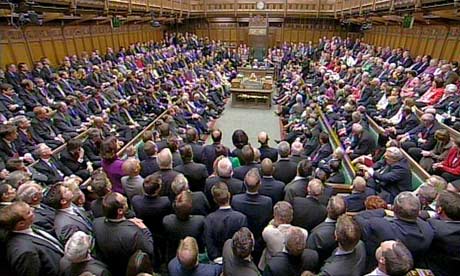The debating chamber is certainly a lot nicer in Holyrood. The seats are better spaced out, there is no need for anyone to stand and every member gets their own desk on which to put their documents. The seating is arranged in such a way as to reflect what was intended to be a more consensual approach to parliamentary politics rather than the confrontational nature of the House of Commons. Aesthetically the chamber at Holyrood is much more pleasing. It has a fresh wooden look and lets in a lot more natural daylight. That in itself could have a more positive effect on the mood of the chamber. The freshness makes it feel closer to nature as was part of the original vision by the Spanish architect Enric Miralles (if you look at the shape of the parliament from above it is like a small litter of leaves). And it's modern. That's important because it sends out the message that this is a democracy that is current and up-to-date or at least more so than Westminster.
Holyrood from a golden eagle's perspective.
The business of parliament is conducted more favourably too. Business is normally concluded by 5pm, no late-night sittings and if there is an exception to that it's rare. Which means members are able to return home earlier and probably get a far better night's sleep as a result which surely has a more positive effect on the politicians' brains. They also spend more time with their families and constituents (very important of course!) and on the whole get more work done. Because of electronic voting, counting is done quickly so no time is wasted by going into a lobby and standing there for half an hour. And the inherent advantage of working for the parliament of a smaller country is of course that the MPs with the furthest to travel can make their journey far quicker than if they were working at Westminster. So for an MSP the work-life balance seems far more favourable.
Of course the democratic advantage to Holyrood can't be underestimated. The irony with Labour setting up a PR system in order to stop the SNP winning an outright majority is that it makes for a compelling parliamentary case for independence. PR means that, except occasionally (like, well, 2011), no party will be able to win an outright majority and so policies have to be more consensual with coalition governments more likely therefore giving a smaller party the chance to win valuable concessions. If only we had PR in Westminster, the politics of England might be far less heavily weighted towards neo-liberal policies. Furthermore if there was regional devolution in England that too would allow legislation to be created that doesn't lean too far in favour of the South-East. And while we have the House of Lords in Westminster with it's unelected representatives, in Holyrood we just have the one chamber which is followed by a cross-party committee and then resubmitted for a second vote in the chamber prior to gaining royal assent. There is possibly the case for a second chamber in Holyrood and I'm inclined to believe it would be a good idea, certainly there's plenty of space at the southern end of the building to make the necessary extension. But that's for another debate.
The Scottish Parliament's crèche with a future stateswoman.
Are Yes campaigners not missing a trick here? This referendum is after all a question of whether certain policies affecting Scotland and currently reserved to UK legislators are all made by Holyrood or continue to be made by Westminster. Which of those two parliaments would you rather have in charge of those policies? The democratically outdated parliament? Or the modern, democratic and family-friendly parliament? If the former vote No to choose Westminster. If the latter vote Yes to choose Holyrood.
If there's a No vote, how long will it be before the Westminster Parliament is reformed and what will be reformed? And in the event of a No vote what areas will be further devolved to Holyrood? Welfare policies? Employment legislation? Oil revenues? Equal opportunities? Air Passenger Duty? These are things guaranteed under independence and a Holyrood parliament is likely to legislate on those policies far better than Westminster and with better democratic consensus. Many people who'd like to keep the union feel that these areas are far too important for them not to be in the Scottish Parliament's control. To vote No therefore is a gamble in the hope that the UK parliament will legislate to allow these new areas of devolution. That could easily sway voters towards the Yes side unless Westminster guarantees the desired extra devolution.
Take your pick: Overcrowded, outdated House of Commons (a).
Or spacious, modern Debating Chamber at Holyrood (b).
So let's give the voters information about the two parliaments and ask them: where would you rather decisions about the running of your country were made, this kind of parliament or this one? Let us make the parliamentary case for independence.




.jpg&container=blogger&gadget=a&rewriteMime=image%2F*)
No comments:
Post a Comment